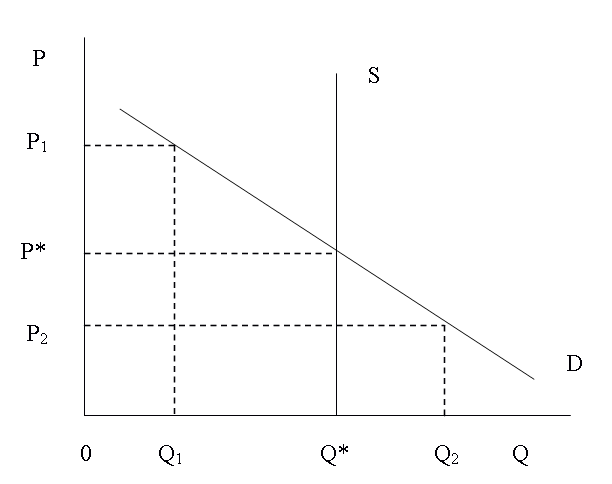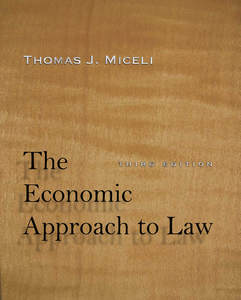Chapter 10
Laws against ticket scalping
Laws against ticket scalping are something of a puzzle to economists because they outlaw mutually beneficial transactions that apparently involve no third party effects. In fact, an argument can be made that scalping establishes the proper market-clearing price in markets where the price is initially set too low. To illustrate, consider the following supply-demand diagram for tickets to a concert.

The supply curve is vertical, reflecting the fixed number of seats in the auditorium. Given the demand curve, the equilibrium price is P*, but suppose that the price for tickets is set too low at P2. The result is an excess demand of Q2•Q*, which manifests itself by a waiting line that allocates the available tickets on a first-come-first-serve basis. (Note that this is an example of the rule of first possession.)
Economic efficiency dictates that the fixed supply of tickets should be allocated to those consumers who value them most as measured by the demand curve. The equilibrium price, P*, does exactly that. In contrast, when the tickets are rationed by waiting, some consumers who value the tickets at less than P* (i.e., those along the demand curve between Q* and Q2) will end up with some of the tickets because they are willing to pay the price P2 and wait longer.
Suppose in particular that the person at Q2 got one of the tickets. She thus paid a price exactly equal to her willingness to pay. At the same time, suppose the person at Q1 did not get a ticket. If there were no restrictions on scalping, there would be room for a mutually beneficial bargain between these two people that involves a sale of the ticket from the person at Q2 to the person at Q1 for a price between P1 and P2. Further, such a bargain would be possible between anyone on the segment Q2 and Q* who got a ticket, and anyone on the segment between 0 and Q* who did not get one. If all such bargains occurred, then the tickets would all end up with consumers in the range between 0 and Q*, which is exactly the ones who should get them based on efficiency. In other words, the process of ticket scalping achieves the efficient allocation of tickets when the market price is initially set too low.
Given this conclusion, the obvious question is why such bargains are outlawed. One possible reason is that allocation based on price alone deprives consumers beyond Q* of ever getting to consume the good in question, which may be viewed as unfair since consumers on this segment will tend to be of lower income. (After all, willingness to pay is determined in part by income.) In the concert example, the equilibrium price may be so high, given the limited number of seats, that pure price rationing would result in mostly wealthy people being able to attend the concert, whereas setting the price below P* and rationing partially by waiting allows some lower income consumers to obtain tickets. And since scalping will tend to undermine this goal, it needs to be outlawed.
While this argument may explain why scalping is illegal, it does not explain why the concert promoter set the price too low to begin with. (Contrast this situation to rent control, where the government puts a ceiling on the price that landlords can set so as to ensure that low income households can obtain affordable housing.) The promoter is presumably interested in maximizing profit and does not care about the make-up of the audience, so it remains a puzzle as to why he would not set the price at P* immediately. One possibility is that there is uncertainty over the demand curve, so P* cannot be determined precisely. Thus, to avoid empty seats, promoters systematically err in the direction of setting the price too low.
